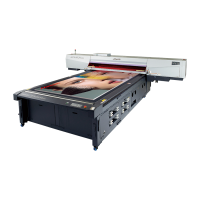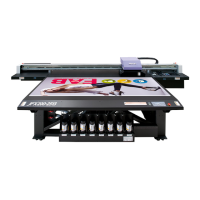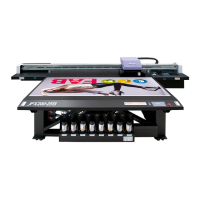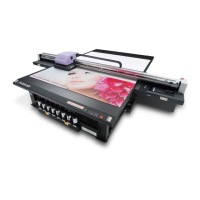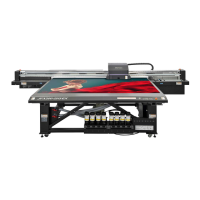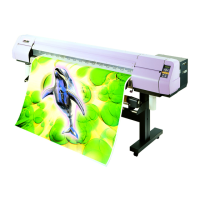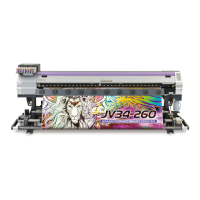Do you have a question about the MIMAKI JFX-1631/1615 Plus and is the answer not in the manual?
Instructions for installing the printer, including space requirements and unboxing.
Overview of the printer's front and rear components and their functions.
Steps for connecting the USB and power cables to the printer.
Details on the UV LED unit and the status indicator lamps.
Information on compatible ink types and precautions for setting ink cartridges.
Information on media sizes and handling precautions for printing.
Explanation of the printer's operational modes: Local, Function, and Remote.
Procedures for regular maintenance and care when the device is unused.
Instructions for replacing ink packs and troubleshooting ink-related issues.
Cleaning procedures for the head guard plate to prevent ink smudges.
Setting up automatic interval wiping and cleaning for the nozzle face.
Detailed steps for cleaning the printer's wipers using cleaning liquid.
Procedure for performing subtank maintenance to resolve errors or unclog nozzles.
Special refresh operations to prevent nozzle clogging, particularly with white ink.
Procedure for disposing of waste ink when the waste ink tray is full.
Specific maintenance procedures for white ink to prevent precipitation and clogging.
Step-by-step guide for replacing the filters for the device's cooling fans.
Procedure for replacing the mist suction filter to maintain air quality.
Correcting misalignment of ink drop position for improved print quality.
Troubleshooting steps when print quality issues persist after cleaning.
Procedure for refilling the ink when print quality is not improved.
Instructions for replacing water and antifreeze liquid in the water heating system.
Guide on how to clean or replace the filter for the UV LED unit.
Displaying and resetting the UV LED unit's irradiation duration.
Procedure to check UV ink curing and adjust UV LED intensity if needed.
Steps to adjust the UV light intensity for optimal ink curing.
Adjusting the vacuum and blowing levels for the optional vacuum unit.
Procedure to draw a test pattern for determining optimal ink drop numbers.
Troubleshooting guide for common issues like no power or printing failures.
Corrective measures for problems affecting print quality like lines or ink drops.
Steps to resolve nozzle clogging issues not fixed by head cleaning.
Using the emergency switch to safely stop the printer during operation.
List of LCD error messages, their causes, and corrective actions.
General warranty disclaimer and important notices regarding product use.
Information on how to get assistance or inquire about the manual.
Compliance statement and interference guidelines for FCC regulations.
Information on potential radio and television interference and how to mitigate it.
Information regarding compliance with CDRH regulations for laser devices.
Details on the scope and purpose of the operation manual.
Explanation of safety symbols used throughout the manual.
Safety guidelines for installing an exhaust outlet system for the printer.
Critical prohibitions to ensure safety and prevent device damage.
Precautions for handling ink cartridges, including toxicity and storage.
Warning against using the device in humid environments to prevent electrical hazards.
Actions to take if the device exhibits smoke, smell, fire, or electric shock.
Requirement for proper grounding to prevent electrical shock.
Recommendations for wearing safety glasses and gloves during specific operations.
Safety precautions related to the power cable to prevent fire or shock.
Warning about potential pinching hazards when opening or closing covers.
Safety precautions when operating the UV LED unit, especially regarding fire hazards.
Caution regarding potential injury from a falling maintenance cover.
Safety warnings related to high voltage and UV LED exposure.
Safety precautions for using the UV LED, especially in flammable environments.
Safety guidelines and procedures for handling antifreeze liquid.
General guidelines for safe and optimal operation of the printer.
Recommendations for preventing dust accumulation to ensure optimal printer performance.
Information about parts that require periodic replacement by service personnel.
Importance of adjusting the printer's level before starting printing operations.
Safety guidelines for storing and handling the maintenance liquid.
Precautions for handling and storing ink cartridges to maintain quality.
Instructions on understanding and maintaining warning labels on the device.
Safety guidelines for storing anti-freezing liquid, especially regarding children.
Health risks associated with UV light exposure and protective measures.
Warnings about hot components and precautions during maintenance.
Guidelines for cleaning the device, including avoiding compressed air.
Precautions to prevent fire and smoking hazards caused by hot parts or dust.
Important notes regarding handling UV LEDs and their performance.
Guidelines for selecting a suitable installation environment for the printer.
Guidance on understanding and locating warning labels on the device.
Guide on how to interpret the manual's layout, characters, and keys.
Instructions for installing the printer, including space requirements and unboxing.
Overview of the printer's front and rear components and their functions.
Steps for connecting the USB and power cables to the printer.
Details on the UV LED unit and the status indicator lamps.
Information on compatible ink types and precautions for setting ink cartridges.
Information on media sizes and handling precautions for printing.
Explanation of the printer's operational modes: Local, Function, and Remote.
Specifies the required space and environmental conditions for printer installation.
Identifies and describes the components located on the front of the printer.
Identifies and describes the components located on the rear of the printer.
Detailed explanation of the controls and display on the printer's operation panel.
Description of the carriage, which houses the print head and UV irradiation appliance.
Location and function of the emergency switches for immediate shutdown.
Instructions for connecting the printer to a computer using a USB 2.0 cable.
Information and warnings regarding the connection of the printer's power cable.
Description of the UV LED unit and safety precautions for its use.
Explanation of the status indicators (green and red lamps) on the unit.
List of compatible ink types and their corresponding colors.
Important considerations and precautions when installing ink cartridges.
Safety guidelines for handling ink cartridges, including storage and disposal.
Maintenance procedures for unused ink slots to prevent head clogging.
Table showing the maximum dimensions of media supported by the printer models.
Guidelines for handling media to prevent issues like warping, shrinkage, or absorption.
Description of the Local Mode, used for printer preparation and settings.
Description of the Function Mode, used for accessing and setting various printer functions.
Description of the Remote Mode, where drawing is controlled by received data.
Instructions on how to operate the printer's cover door during media setting and drawing.
Overview of the standard operational sequence from power-on to power-off.
Step-by-step guide for powering on the printer and initiating local mode.
Procedures for correctly placing and securing media onto the printer's table.
How to perform a test drawing to check for nozzle clogging and print quality.
Detailed instructions for performing different types of head cleaning.
Steps to transmit image data from a computer and start the drawing process.
Procedure for safely powering down the printer and its connected systems.
Steps for opening the door and setting the media on the table.
Instructions for closing the door and performing drawing operations.
Visual guide outlining the sequence of operations for using the printer.
Detailed steps to power on the printer, including checks and mode activation.
Detailed procedure for setting media, including suction valve adjustment and absorption.
Diagrams illustrating the absorption areas for different printer models.
Instructions for executing a test drawing and checking the results.
Procedure for performing Normal, Hard, or Subtank Maintenance head cleaning.
Procedure for performing head cleaning using the Wiping method.
Setting up automatic head cleaning upon printer startup.
Steps to transmit image data from a computer and start the drawing process.
Procedure to interrupt the drawing operation and clear data.
Instructions for moving the Y-bar for checking drawing results or setting view positions.
Procedure to move the Y-bar away from the table for inspection or removal.
Steps for safely shutting down the printer and connected systems.
Explanation of the automatic function to prevent nozzle clogging during power-off.
Methods for changing the printer's origin point for drawing.
Procedures for registering media thickness and adjusting head gap.
Overview of miscellaneous functions like data clearing and displaying device information.
Section covering various printer settings like print method and UV LED intensity.
Guidance on using guide holes for accurate media placement.
Instructions for adjusting the height of the Post Cure Unit based on media thickness.
Information on using the Post Cure Unit, including drawing range adjustments.
Precautions and steps for attaching UV shade curtains when printing on thick media.
Procedure for turning on the power supply for the Post Cure Unit.
How to adjust the drawing range when using the post cure function.
Setting the post cure unit's use method, including secondary curing options.
Steps to enlarge the UV irradiation area of the post cure unit.
Procedure to re-irradiate lamp light for thorough ink curing.
Instructions and warnings related to replacing the UV LED lamp.
Tips and precautions for optimal use of the post cure unit, especially with thick media.
Procedure to change the drawing origin using the jog keys on the operation panel.
Method to precisely set the drawing origin coordinates using the function menu.
Steps to manually input the media thickness for accurate printing.
Procedure to adjust the head gap using the up and down cursor keys.
Automatic measurement of media thickness using the gap pin on the carriage.
Inputting the precise value for the gap between the print head and the media.
Operation to erase unnecessary data from the printer's memory.
How to view stored information such as ink levels and firmware versions.
Configuring the print method settings, including quality, scan direction, and logical seek.
Adjusting the UV LED light intensity in stages for optimal curing.
Selecting priority between device settings and computer (HOST/PLOT) settings.
Configuring the printer's behavior after drawing (return to local or remote mode).
Option to select the display language between Japanese and English.
Procedure to print a list of current printer settings for records.
How to access and view detailed machine information like serial number and firmware version.
Adjusting settings like ink layers, refresh level, units, and UV scan addition.
Procedure to reset printer settings to their default values.
Reference dimensions for preparing guides using the table's arrangement of guide holes.
Steps to adjust the Post Cure Unit's height using jigs for proper media alignment.
Information on how the Post Cure Unit affects the Y-bar movement and drawing range.
Precautions and steps for attaching UV shade curtains when printing on thick media.
Procedure for turning on the power supply for the Post Cure Unit.
How to adjust the drawing range when using the post cure function.
Setting the post cure unit's use method, including secondary curing options.
Registering UV irradiations and image length for 'after print' mode.
Required settings to enlarge the UV irradiation area of the post cure unit.
Method for setting the start and end positions for lamp light irradiation.
Procedure for replacing the UV LED lamp when notified by the machine.
Procedures for regular maintenance and care when the device is unused.
Instructions for replacing ink packs and troubleshooting ink-related issues.
Cleaning procedures for the head guard plate to prevent ink smudges.
Setting up automatic interval wiping and cleaning for the nozzle face.
Detailed steps for cleaning the printer's wipers using cleaning liquid.
Procedure for performing subtank maintenance to resolve errors or unclog nozzles.
Special refresh operations to prevent nozzle clogging, particularly with white ink.
Procedure for disposing of waste ink when the waste ink tray is full.
Specific maintenance procedures for white ink to prevent precipitation and clogging.
Step-by-step guide for replacing the filters for the device's cooling fans.
Procedure for replacing the mist suction filter to maintain air quality.
Correcting misalignment of ink drop position for improved print quality.
Troubleshooting steps when print quality issues persist after cleaning.
Procedure for refilling the ink when print quality is not improved.
Instructions for replacing water and antifreeze liquid in the water heating system.
Guide on how to clean or replace the filter for the UV LED unit.
Displaying and resetting the UV LED unit's irradiation duration.
Procedure to check UV ink curing and adjust UV LED intensity if needed.
Steps to adjust the UV light intensity for optimal ink curing.
Adjusting the vacuum and blowing levels for the optional vacuum unit.
Procedure to draw a test pattern for determining optimal ink drop numbers.
Troubleshooting guide for common issues like no power or printing failures.
Corrective measures for problems affecting print quality like lines or ink drops.
Steps to resolve nozzle clogging issues not fixed by head cleaning.
Using the emergency switch to safely stop the printer during operation.
List of warning messages, their causes, and corrective actions for the printer.
Detailed technical specifications for the printer's hardware components.
Information regarding the types, colors, capacity, and storage of inks.
Visual representation of the printer's operational flow and menu navigation.
| Print Resolution | 1200 x 1200 dpi |
|---|---|
| Ink Type | UV-curable ink |
| Number of Ink Colors | 6 colors + White + Clear |
| Media Thickness | Up to 50 mm |
| Operating Environment | Temperature: 20 - 30°C, Humidity: 35 - 65% RH |
| Print Speed | Up to 25 m²/h |
